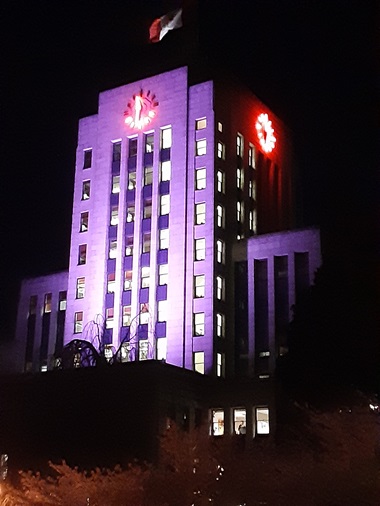
Vancouver City Hall, lit up for the Transgender Day of Visibility March 31.
On Good Friday, President Joe Biden issued a proclamation honouring “the extraordinary courage and contributions of transgender Americans” for the Transgender Day of Visibility on March 31, which was also Easter Sunday.
Negative reaction was swift. Republican Speaker of the House of Representatives Mike Johnson described the proclamation as “outrageous and abhorrent.” But critique was not restricted to political circles. Many of his fellow Roman Catholics, and other Christians, were also upset.
Some saw Biden’s proclamation as pointing to a dark future. Dr. Michael Brown’s column, for example, was titled: ‘America in Moral Freefall: Have We Become a Pagan Society?’
Closer to home
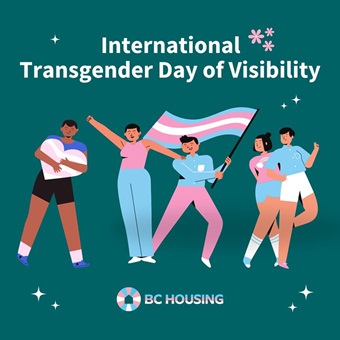
BC
I hadn’t thought about it as a local issue until I was writing about Jennie Gaglardi Place (also this week). As I scrolled down for BC Housing’s March 26 tweet about the opening – they partnered with Christian Life Assembly to develop the five-storey, 98-unit project – I noticed their March 31 tweet:
We proudly celebrate and support the vibrant and diverse transgender community throughout the province.
Nothing on Easter, though there were tweets in March about Ramadan and Nowruz (and “Happy Holidays from all of us at BC Housing!” December 25).
City of Vancouver
Then I checked the City of Vancouver’s tweets, recalling that I had commented on their ‘Official Celebrations and Observances’ policies in 2020.
The city tweeted March 31:
Today, on Transgender Day of Visibility, we reaffirm our steadfast support for transgender, non-binary, gender diverse & Two Spirit communities in #Vancouver. Today and every day, we stand with and support you.
They did also tweet a ” joyful Easter Sunday celebration,” accompanied by a basket full of eggs.
I then looked at the city’s Official Celebrations and Observances page. There I noticed that Easter – the key Christian celebration of the year for a good portion of the city’s population – is not included.
Christmas was the only Christian event (and it had not been there when I checked in 2020). As I wrote then: “I was told, in a very polite and responsive return email, that Christmas was supposed to be on the list, and had just been left off inadvertently”). And of course Christmas is hardly seen as a uniquely Christian event in our culture; check event listings in most publications during that season and see how most focus on Santa Claus.
Of the 19 official celebrations and observances that are listed, three are specifically Muslim – Ramadan, Eid al-Fitr, Eid al-Adha – and two others – Day of Remembrance and Action on Islamophobia and Nowruz – are completely, or significantly, tied to Islam.
Premier David Eby
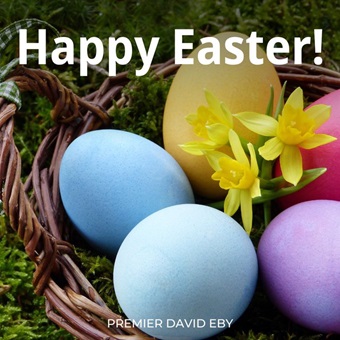 BC’s leader, Premier David Eby did tweet about both the Transgender Day of Visibility and Easter. His two tweets for the former echoed those of BC Housing and the City of Vancouver.
BC’s leader, Premier David Eby did tweet about both the Transgender Day of Visibility and Easter. His two tweets for the former echoed those of BC Housing and the City of Vancouver.
About Easter his two tweets read:
The squeals of kids searching for chocolate eggs, relatives coming together, getting out in the warmer weather, and the sugar crash that inevitably follows, these are the sounds of Easter.
During this Easter long weekend, I hope you’re able to spend time with family and loved ones, From my family to yours, Happy Easter!
On April 1 he posted six tweets honouring Sikh Heritage Month in BC.
No proclamations
Joe Biden proclaimed March 31 as the Transgender Day of Visibility. Was that a shrewd move politically? Or a disaster? Or just a coincidence; the day has been celebrated on March 31 since 2009. Time will tell.
But what he also did was to issue another statement on Easter Sunday, stating that it “reminds us of the power of hope and the promise of Christ’s Resurrection. As we gather with loved ones, we remember Jesus’ sacrifice. We pray for one another and cherish the blessing of the dawn of new possibilities.”
Closer to home, BC Housing, the City of Vancouver and Premier David Eby didn’t make any proclamations – they just quietly tweeted about what they thought was important.
Our reaction?
I’ll admit that my first reaction was a muted version of some of the outraged responses cited above. I find it frustrating to see politicians promoting a constellation of views which almost seem to constitute a new religion. And when I see politicians cozying up to other religious groups, often, apparently, to curry favour.
I’ve put it into perspective over the past few days. Everyone has a right to their views (even if mistaken), and supporting various ethnic and religious groups also stems from a sincere desire to respect and reflect all groups in our community. It seems clear that Biden’s proclamation, and the local tweets, are based on a belief that they are protecting a disadvantaged and bullied group of people. Christians should always want to support such motives, if not necessarily the full surrounding agenda.
How should we react when God is ignored and our Christian faith is sidelined? That is far too broad a topic to address properly here, but these are some thoughts that come to mind.
- In a moral freefall?
There are plenty of signs that we are in a moral freefall. Some will point to abortion, gender confusion, sexual immorality and assisted suicide, others to inhuman treatment of prisoners, lack of care for the poor, racism and poor treatment of refugees and immigrants. I agree.
The decline of Christianity in the West is obviously a factor.
But a look back over history demonstrates that human beings and their governments (and churches) often chase down false trails, and the church’s fortunes have waxed and waned.
- Is this discrimination?
Sure, there is discrimination out there. I well remember my attitude towards Christians before I became one – dismissive, mostly, often derisive when they spoke up. But many at that time, and now, are more generous than that, despite our obvious flaws.
Sometimes the lack of recognition of things Christian is an overreaction rather than a sign of discrimination – after all, I remember being obliged to recite the Lord’s Prayer (every day I think) at Lord Byng High School. And sometimes it simply reflects the fact that there are now so many competing interests jockeying for attention.
Though it would be encouraging to receive more appreciation and attention from our local politicians and bureaucrats, we are still very much accepted as part of the culture,
They are happy to work with us on many fronts. Provincial and municipal politicians were there cutting the ribbon at the opening of Christian Life Assembly’s Jennie Gaglardi Place. They will be there in force at the 57th Annual BC Leadership Prayer Breakfast in May. They support the Salvation Army, UGM and Christian schools – the list goes on.
- Does it matter?
Really, who cares whether the city or the province or the federal government overlooks, underestimates or mischaracterizes our faith? Well, many do. I do. But does it really matter?
I’m sure there is room for a good debate here between Calvinists and Arminians, between state churches and free churches. I’ll stick to one point. It is false, and harmful to the broader community, to downplay our Christian heritage.
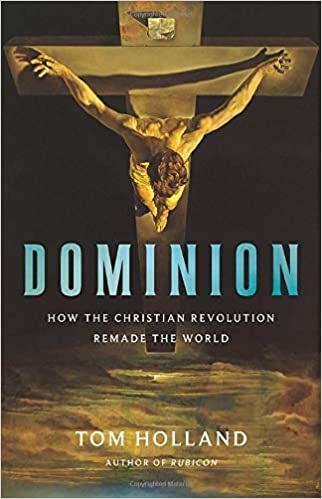 As I mulled over the issues, i was reminded of Tom Holland’s views in Dominion: How the Christian Revolution Remade the World. He wrote, near the beginning of his impressive 612-page book:
As I mulled over the issues, i was reminded of Tom Holland’s views in Dominion: How the Christian Revolution Remade the World. He wrote, near the beginning of his impressive 612-page book:
To live in a Western country is to live in a society still utterly saturated by Christian concepts and assumptions. This is no less true for Jews or Muslims than it is for Catholics or Protestants. Two thousand years on from the birth of Christ, it does not require a belief that he rose from the dead to be stamped by the formidable – indeed the inescapable – influence of Christianity.
Whether it be the conviction that the workings of the conscience are the surest determinants of good law, or that Church and state exist as distinct entities, or that polygamy is unacceptable, its trace elements are to be found everywhere in the West.
Even to write about it in a Western language is to use words shot through with Christian connotations. ‘Religion,’ ‘secular,’ ‘atheist’: none of these are neutral. All, though they derive from the classical past, come freighted with the legacy of Christendom. Fail to appreciate this, and the risk is always of anachronism. The West, increasingly empty though the pews may be, remains firmly moored to its Christian past.
Some people, Holland notes, will rejoice at the neglect of our Christian past. We ought not to encourage them. He adds: “[Christianity] is – to coin a phrase – the greatest story ever told.” Let’s not miss the natural opportunities we have to introduce others to that story.
- Lack of unity?
I do think the church has failed to act in a coordinated way. We have many good works, both in churches and through various ministries, but we are not displaying a common front to our culture. There are areas where we will find it hard to agree – but more areas, more fundamental areas, on which we can agree.
Metro Vancouver Christians keep in touch in a number of ad hoc ways, but it would be beneficial to have a more official network of churches to engage with the city, or BC Housing, of the provincial government. And for them to hear from – even if unbidden – from time to time.
The church in Canada has lost much of its confidence. Certainly, our record is blemished by residential schools and other failings. But we need to lift our eyes, and remember what Jesus asked of us in the wake of His resurrection:
Then Jesus came to them and said, “All authority in heaven and on earth has been given to me. Therefore go and make disciples of all nations, baptizing them in the name of the Father and of the Son and of the Holy Spirit, and teaching them to obey everything I have commanded you. And surely I am with you always, to the very end of the age.” Matthew 28:18-20
It should be abundantly clear to our culture that Easter is about more than colourful eggs – and that we are not threatened by announcements of other celebrations.
The big picture
We ought to participate in the day-to-day activities of our culture and interact with our political leaders. But it is always good to keep the big picture in mind.
Tom Holland concluded Dominion with these words, particularly poignant during the Easter season:
This is why the cross, that ancient implement of torture, remains what it has always been: the fitting symbol of the Christian revolution. It is the audacity of it – the audacity of finding in a twisted and defeated corpse the glory of the creator of the universe – that serves to explain, more surely than anything else, the sheer strangeness of Christianity, and of the civilization to which it gave birth.
Today, the power of this strangeness remains as alive as it has ever been. It is manifest in the great surge of conversions that has swept Africa and Asia over the past century; in the conviction of millions upon millions that the breath of the Spirit, like a living fire, still blows upon the world; and, in Europe and North America, in the assumptions of many more millions who would never think to describe themselves as Christian.
All are heirs to the same revolution: a revolution that has, at its molten heart, the image of a god dead on the cross.
It is possible that God is not as worried as I am about what Joe Biden pronounces, or what local governments and their various bodies choose to celebrate. But God does enjoin us to respect our political leaders – and in a democratic nation, that can surely include offering suggestions and even critiques of particular policies and actions.
A March 31 article by Dustin Guastella in the socialist magazine Jacobin describes the surprisingly positive reception of Dominion by socialist, Marxist and liberal thinkers. He stated, “For some, searching for a surer moral footing upon which to launch a socialist political program has again raised the specter of Christian ethics”:
Today, many of those who identify as leftists take pride in being excised of “bourgeois” morality, sentimentality and prudishness. But . . . we replace bourgeois morality with amorality at our own peril. On any number of important questions pertaining to the family, faith, work, discipline, education, etc., some radical now responds, “Who needs it?”
This may be a politically incorrect answer, but it’s not a dishonest one. Any socialist confronted with genuine moral questions is forced to confront a paradox: socialism, the most moral of causes, seems to lack a coherent moral theory all its own. . . .
Until and unless the Left can develop a consistent moral theory of its own, Christianity will continue to have something useful to say about the biggest social questions that confront modern society. Maybe it’s worth listening.
The same applies to the right, and everyone in between.
***********************************
Light up the city
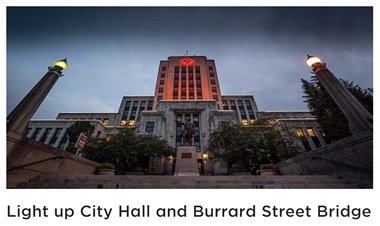 In case anyone is interested in requesting illumination for City Hall (and the Burrard Street Bridge), you can learn how to apply here.
In case anyone is interested in requesting illumination for City Hall (and the Burrard Street Bridge), you can learn how to apply here.
The city posts this
City Hall and Burrard Street Bridge have an LED light display that’s used to recognize important events and cultural occasions.
We welcome your request to illuminate City Hall and Burrard Street Bridge if it’s for one day only and your event or awareness campaign has a direct connection to Vancouver residents.
Here are the illuminations planned for the April, and every year.
- Upcoming illuminations
- March 31, Trans Day of Visibility (Pink, White, Blue)
- April 1, Royal Canadian Air Force Centennial (Blue)
- April 2, Sikh Heritage Month (Orange)
- April 3, Premenstrual Disorders Awareness Month (Teal)
- April 4, National Dental Hygienists Week (Purple)
- April 7, Green Shirt Day (Green)
- April 8, Cancer Awareness Month (Yellow)
- April 9, Eid al-Fitr (Green)
- April 11, Parkinson’s Awareness Month (Blue)
- April 13, Sikh Heritage Month (Orange)
- April 15, Emergency Service Dispatchers and 9-1-1 Awareness Week (Blue)
- April 17, World Hemophilia Day (Red)
- April 19, Global Congenital Diaphragmatic Hernia Awareness Day (Baby Blue)
- April 25, Canadian Fertility Awareness Week (Green)
- April 27, Lapu-Lapu Day (Blue, Red, Yellow, White)
- April 29, World Wish Day (Blue)
- April 30, Sikh Heritage Month (Orange)
- Ongoing illuminations (2024)
- January 27, International Holocaust Remembrance Day (Yellow)
- January 29, Day of Remembrance and Action Against Islamophobia (Green)
- February 1, Black History Month (Black, Red, Green and Gold)
- February 10, Lunar New Year (Red)
- March 8, International Women’s Day (Purple)
- March 10, Ramadan (Green)
- March 19, Nowruz (Green)
- March 21, International Day for the Elimination of Racial Discrimination (UN Blue)
- April 9, Eid al-Fitr (Green)
- May 23, Komagata Maru Remembrance Day (Orange)
- June 1, Italian Heritage Month (Green, White, Red)
- June 16, Eid al-Adha (Green)
- June 20, World Refugee Day (Orange)
- June 21, National Indigenous Peoples Day (Orange)
- July 28, Pride Week (Rainbow)
- October 31, Diwali (Yellow)
- November 11, Remembrance Day (Red)
- November 20, Transgender Day of Remembrance (Pink, Blue and White)
- December 3, International Day of Persons with Disabilities (Purple)
The only ‘official celebrations and observances’ day that doesn’t also have ‘ongoing illuminations’ is Christmas (though to be fair there is normally a giant decorated Christmas tree out front of City Hall, if I’m not mistaken). What does have the ‘ongoing illumination’ is the Transgender Day of Remembrance (Pink, Blue and White) November 20. Thus, the same look as on March 31.
I sent a General feedback comment/question to the City of Vancouver April 1, but haven’t heard back yet.
April 4: I received a response from Natti Schmid, Chief, External Relations and Protocol, Office of the City Clerk | City of Vancouver:
Thank you for reaching out and sharing your concerns regarding the City of Vancouver’s recognition of various religious and cultural observances.
The Official Celebrations and Observances recognized by the City are determined through Council motions. City staff follow the direction set by these council-approved motions when planning our public recognition of these days, which includes social media posts, illuminations, proclamations, and web content. Any additional days recognized on social media that fall outside of this list align with current Council priorities, motions or current City strategies underway.
The City is committed to fostering an environment where all cultural and religious celebrations are acknowledged respectfully, and we value your feedback as it aids our ongoing efforts to ensure that our practices align with the values of inclusivity and representation we strive for as a City.
Your engagement is vital in helping us build a more inclusive and representative city. We welcome ongoing dialogue and your active participation in our community’s conversations and decision-making processes.
Have a wonderful day.
Very much appreciated. Thank you Natti.
April 9 note: Just by chance I was watching a few minutes of the Vancouver City Council meeting today (starting about 9:35:10) and saw the City Councilors gather together to read a proclamation of Eid al-Fitr April 10 in the City of Vancouver. Muslim representatives then joined them to speak.

Thanks, Flyn, for your balanced and reasoned article. It invites further, ongoing dialogue on several fronts. Holding our emotions in check is not an easy task when we see the continued erosion of Christian/biblical values in our general culture, especially being more or less ignored by officialdom. At least it gives us a clear picture of who call the shots and what their values are.
The church needs to become more engaged and step up its gospel messaging/proclamation as something relevant in today’s social and cultural environment. To be more confident and less fearful, but not in a confrontational way, rather tempered and informed by love.
Thanks Flyn . . . I was struck by your reminder: “The church in Canada has lost much of its confidence . . .” Focusing on Resurrection Sunday gives a fresh hope that trumps the Easter Bunny. Good insight!